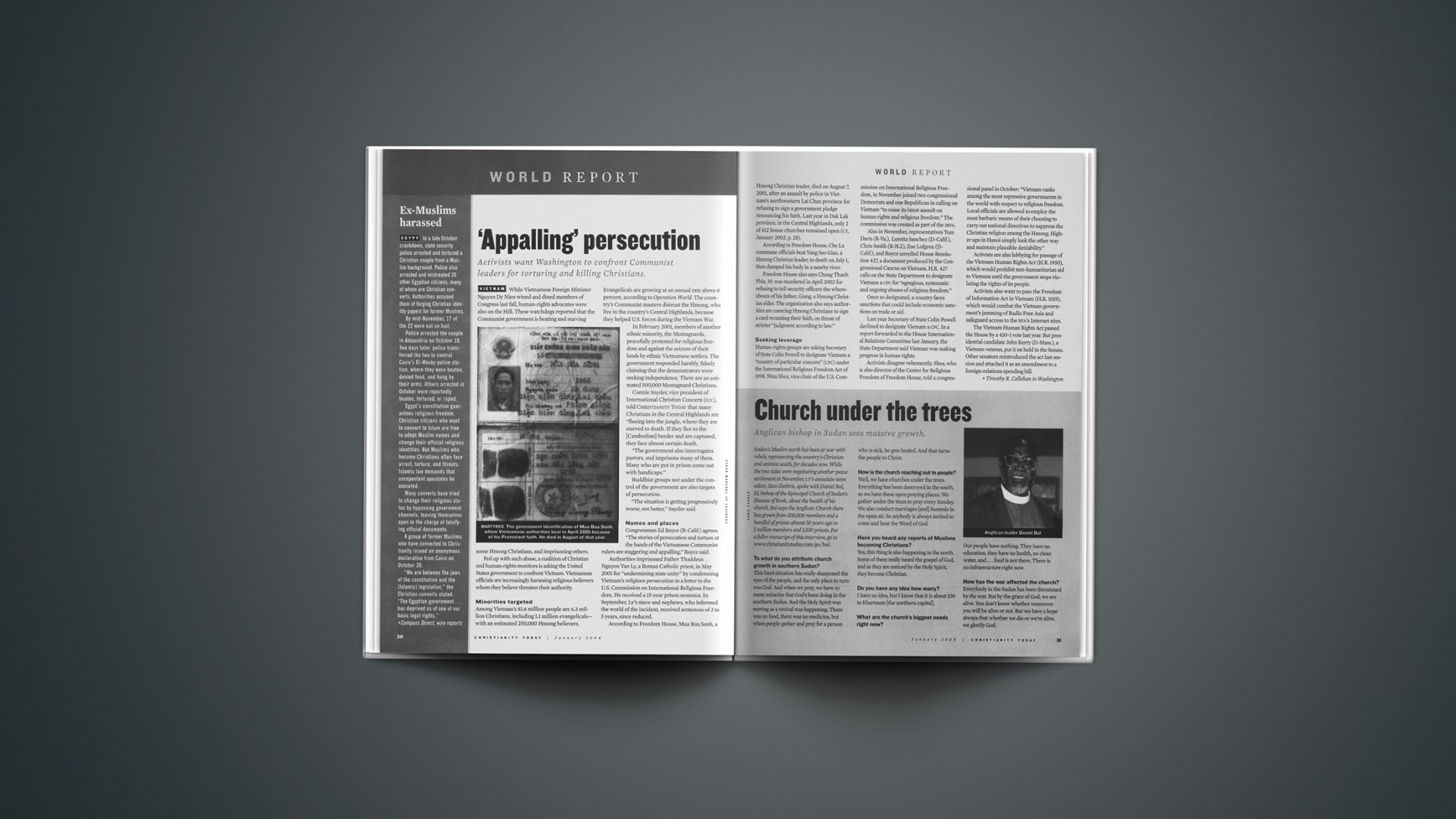While Vietnamese Foreign Minister Nguyen Dy Nien wined and dined members of Congress last fall, human-rights advocates were also on the Hill. These watchdogs reported that the Communist government is beating and starving some Hmong Christians, and imprisoning others.
Fed up with such abuse, a coalition of Christian and human-rights monitors is asking the United States government to confront Vietnam. Vietnamese officials are increasingly harassing religious believers whom they believe threaten their authority.
Minorities targeted
Among Vietnam’s 81.6 million people are 6.3 million Christians, including 1.1 million evangelicals—with an estimated 250,000 Hmong believers. Evangelicals are growing at an annual rate above 6 percent, according to Operation World. The country’s Communist masters distrust the Hmong because they helped U.S. forces during the Vietnam War.
In February 2001, members of another ethnic minority, the Montagnards, peacefully protested for religious freedom and against the seizure of their lands by ethnic Vietnamese settlers. The government responded harshly, falsely claiming that the demonstrators were seeking independence. There are an estimated 500,000 Montagnard Christians.
Connie Snyder, vice president of International Christian Concern (ICC), told Christianity Today that many Christians in the Central Highlands are “fleeing into the jungle, where they are starved to death. If they flee to the [Cambodian] border and are captured, they face almost certain death.
“The government also interrogates pastors, and imprisons many of them. Many who are put in prison come out with handicaps.”
Buddhist groups not under the control of the government are also targets of persecution.
“The situation is getting progressively worse, not better,” Snyder said.
Names and places
Congressman Ed Royce (R-Calif.) agrees. “The stories of persecution and torture at the hands of the Vietnamese Communist rulers are staggering and appalling,” Royce said.
Authorities imprisoned Father Thaddeus Nguyen Van Ly, a Roman Catholic priest, in May 2001 for “undermining state unity” by condemning Vietnam’s religious persecution in a letter to the U.S. Commission on International Religious Freedom. He received a 15-year prison sentence. In September, Ly’s niece and nephews, who informed the world of the incident, received sentences of 3 to 5 years, since reduced.
According to Freedom House, Mua Bua Senh, a Hmong Christian leader, died on August 7, 2001, after an assault by police in Vietnam’s northwestern Lai Chau province for refusing to sign a government pledge renouncing his faith. Last year in Dak Lak province, in the Central Highlands, only 2 of 412 house churches remained open.
According to Freedom House, Che La commune officials beat Vang Seo Giao, a Hmong Christian leader, to death on July 1, then dumped his body in a nearby river.
Freedom House also says Chong Thanh Phia, 10, was murdered in April 2002 for refusing to tell security officers the whereabouts of his father, Giang, a Hmong Christian elder. The organization also says authorities are coercing Hmong Christians to sign a card recanting their faith, on threat of stricter “judgment according to law.”
Seeking leverage
Human-rights groups are asking Secretary of State Colin Powell to designate Vietnam a “country of particular concern” (CPC) under the International Religious Freedom Act of 1998. Nina Shea, vice chair of the U.S. Commission on International Religious Freedom, in November joined two congressional Democrats and one Republican in calling on Vietnam “to cease its latest assault on human rights and religious freedom.” The commission was created as part of the IRFA.
Also in November, representatives Tom Davis (R-Va.), Loretta Sanchez (D-Calif.), Chris Smith (R-N.J.), Zoe Lofgren (D-Calif.), and Royce unveiled House Resolution 427, a document produced by the Congressional Caucus on Vietnam. H.R. 427 calls on the State Department to designate Vietnam a CPC for “egregious, systematic and ongoing abuses of religious freedom.”
Once so designated, a country faces sanctions that could include economic sanctions on trade or aid.
Last year Secretary of State Colin Powell declined to designate Vietnam a CPC. In a report forwarded to the House International Relations Committee last January, the State Department said Vietnam was making progress in human rights.
Activists disagree vehemently. Shea, who is also director of the Center for Religious Freedom of Freedom House, told a congressional panel in October: “Vietnam ranks among the most repressive governments in the world with respect to religious freedom. Local officials are allowed to employ the most barbaric means of their choosing to carry out national directives to suppress the Christian religion among the Hmong. Higher ups in Hanoi simply look the other way and maintain plausible deniability.”
Activists are also lobbying for passage of the Vietnam Human Rights Act (H.R. 1950), which would prohibit non-humanitarian aid to Vietnam until the government stops violating the rights of its people.
Activists also want to pass the Freedom of Information Act in Vietnam (H.R. 1019), which would combat the Vietnam government’s jamming of Radio Free Asia and safeguard access to the RFA’s Internet sites.
The Vietnam Human Rights Act passed the House by a 410-1 vote last year. But presidential candidate John Kerry (D-Mass.), a Vietnam veteran, put it on hold in the Senate. Other senators reintroduced the act last session and attached it as an amendment to a foreign-relations spending bill.
Copyright © 2004 Christianity Today. Click for reprint information.










